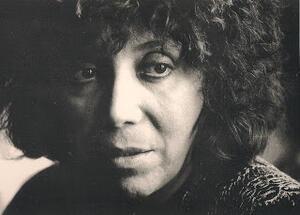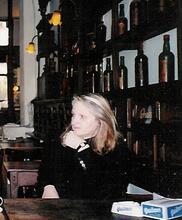Aida Bortnik
Aída Bortnik was an Argentine journalist, dramaturge, and screenwriter. She wrote the first Argentine screenplay nominated for an Academy Award (“The Truce,” 1974), an award she later won for best foreign film in 1986 for “The Official Story.” Having studied both law and theater, Bortnik dedicated herself to creating culture with a social conscience, and she went into exile in Europe when the military dictatorship broke out in 1976. Returning to Argentina in 1979, she continued to write satirical journalism and scripts for both film and theater that contested the dictatorship. Upon her death in 2013, she was heralded by Argentine society at large as the greatest playwright of her day.
Life Context
Aída Bortnik was an Argentine journalist, dramaturge, and screenwriter. Bortnik holds the distinction of having penned the first Argentine screenplay nominated for an Academy Award (The Truce, 1974), an award she later won in 1986 for best foreign film for The Official Story. Bortnik is notable for being the first Argentine to pen a screenplay that addressed the country’s military dictatorship and for being the first Latin American to be admitted as a permanent member of the Academy of Motion Picture Arts and Sciences. Having studied both law and theater in her youth, Bortnik is remembered for her socially and politically oriented—and often feminist—contributions to journalism, as well as activist theater and screenplays.
In eerie similarity to Frida Kahlo, Aida Bortnik was involved in a tragic bus accident at the age of twenty that left her bed-ridden for four years; in Bortnik’s case, she was left with one amputated limb. The accident ended Bortnik’s acting aspirations and her university career (Levine 2008). From then on self-taught, Bortnik reportedly admired Anton Chekhov and Isaac Babel, whom she studied during her diligent scholarship of world literature (Levine 2008). Bortnik later worked as a journalist for the Argentinian papers Primera Plana, Panorama, and La Opinion and began to work as a screenwriter.
In 1975, Bortnik was blacklisted by the AAA (Argentine Secret Police). In the early years of the Argentine military dictatorship of 1976-1983, she fled to France and then to Spain, where she worked in Spanish television for three years. Bortnik returned to Argentina in 1979. Although she had ostensibly returned for one month to edit a film she had written, Bortnik remained in Argentina for the rest of the dictatorship. At this time, she joined an existing cadre of intellectuals, artists, playwrights, and journalists seeking to counter the official narrative of the “proceso de reorganización militar” (the Process of National Reorganization, as the dictatorship called its political war campaign), primarily through activist theater. Bortnik helped found the Open Theater (Teatro Abierto) organization and participated in the satirical journal Humor Registrado (Official Humor, known as Hum®). Both forms of cultural activism were risky. Editions of the journal were confiscated and, on occasion, burned; the editorial offices were constantly monitored and policed; and after particularly inflammatory editions were released, editors and contributors reportedly stayed in hotels for days for fear of being abducted by the secret police (Levine 2008). Likewise, the plays put on by the Open Theater were subversive; on one occasion, when Diana Raznovich’s feminist play The Disconcerted (El desconcierto) was staged, the theater was burned down (Taylor 1997, Wassner 2017).
Professional Trajectory: Film
In 1972 Bortnik began to establish herself as a well-known playwright through such productions as Soldiers and Little Soldiers (Soldados y soldaditos) and her adaptations of Mario Benedetti’s Truce (la Tregua) for both television (1972) and film (1973). The latter earned her the first Academy Award nomination for an Argentine screenplay. By 1983, Bortnik was a household name in Argentina. Her screenplay for Poor Butterfly (Pobre mariposa) won her international acclaim, reinforced by her receipt of the Ennio Flaiano award for best international screenwriter.
Bortnik’s best-known cultural contribution, as much at home and abroad, is her collaboration with Luis Puenzo on the film The Official Story (La historia oficial). The Official Story approaches the theme of military violence coupled with societal silence through the fate of the children of “the disappeared” (“los desaparecidos”), the euphemism given to those abducted and murdered by the military dictatorship for behavior and opinions deemed subversive. In so doing, the film exposes the very thin line between a society of willful neglect and one of perpetrators and collaborators. Bortnik also provides a feminist analysis of the actions of the Madres (mothers) and Abuelas (grandmothers) of “the disappeared,” a campaign of terror, torture, and murder that is today considered to have been nothing less than state-sanctioned genocide. Bortnik uses film to place both blame and power in the hands of society. The issue of the children of “the disappeared” not only speaks to an estimate of 400 such children, but also centers this issue among the reverberating repercussions and lasting legacy of Argentina’s violent and unresolved years under dictatorship.
Professional Trajectory: Theater
Bortnik’s willingness to contest the government’s narrative of democracy and freedom took on a new dimension when she returned to Buenos Aires in 1979. Although she only intended to stay for one month, she was compelled to remain in Buenos Aires in order to counter the narratives of normalcy placed on the military dictatorship’s policies of terror (Levine 2008). Bortnik became a founding member of the Open Theatre (Teatro Abierto), an activist theater ensemble that at first consisted of 21 dramaturges. Bortnik was one of three women involved; the others were Diana Raznovich and Griselda Gambaro (Levine 2008). In her plays, Bortnik emphasized the dislodging of women from conventional roles by political events, often in response to circumstances beyond their choosing. Like the rest of her works, Bortnik’s plays are noted for presenting courage as a moral choice (Glickman 1997). Her heroines are consistently forced to question their otherwise unexamined realities and, through a process of maturation, claim ownership over their own consciousness and actions.
Professional Trajectory: Journalism
Between 1981 and 1983, Bortnik wrote 30 short stories, or cuentitos, in a satirical journal called Hum®. Their content and context within the subversive magazine served as yet another arm of Bortnik’s courageous denunciation of the dictatorship as the latter desperately tried to maintain power over its terrorized population (Levine 2008, Feitlowitz 1998).
Bortnik occasionally featured the motif of Holocaust memory in her satirical short stories, including in “Eighteen Years Old” “Dieciocho años,” 1982), “Let’s Make a List” (“Hagamos una lista,” 1983), and “Julius Golden Mountain” (“Julio Montaña Dorada,”1983) (Wassner 2017). In each short story, Bortnik brings Holocaust experience and testimony into contemporary narrative discourse as a foil through which to understand the relationship between democratic fragility and state systems of terror. In so doing, she numbers among a handful of Argentine Jewish women writers (including Diana Raznovich and Nora Glickman) who use the post-Holocaust legacy as a moral compass for Argentina during a time of political genocide, in which all were forced to reckon with their own roles as perpetrator, bystander, or victim (Wassner 2017). In her short stories, plays, and film scripts, Bortnik also provides an affront to society’s gendered power structures. In the short story “She and Men” (“Ella y los hombres”), for example, a woman is depicted at five-year intervals, always defining herself in relation to the man she is with at the time. Only at age 95 does she have a partner who asks her about her own preferences (Levine 2008). In the story “18 Years” (“18 Años”), Bortnik tells the story of a protagonist female butterfly and a young Argentine male soldier while employing intertwined imagery of the Jewish vow to always recall Jerusalem alongside Pavel Friedman’s famous butterfly (Wassner 2017).
Selected Works by Aída Bortnik
Theater:
Soldados y soldaditos (1972)
Tres por Chéjov (1974)
Dale nomás (1975)
Papá querido (1981)
Domesticados (1981)
De a uno (1983)
Primaveras (1984).
Film:
La tregua (1974)
Una mujer (1975)
La historia official (1985)
Pobre mariposa (1986)
Caballos salvajes (1995)
Cenizas del paraíso (1997)
La soledad era esto (2001)
Journalism
Hum®, 1981-1983.
Short Stories
"Celeste's Heart." In Oy, Caramba! An Anthology of Jewish Stories from Latin America, edited by Ilan Stavans. Albuquerque: University of New Mexico Press, 2016.
“Short Little Stories.” Latin American Literature Today. http://www.latinamericanliteraturetoday.org/en/2020/may/short-little-st…
Feitlowitz, Marguerite. A Lexicon of Terror: Argentina and the Legacies of Torture. Oxford: Oxford University Press, 1998.
Glickman, Nora. “Los gritos silenciados en el teatro de Aída Bortnik, Alberto Adellach, Eduardo Pavlovsky y Ariel Dorfman.” Revista Hispánica Moderna, Año 50, No. 1 (June 1997): 180-189.
Glickman, Nora. “Discovering Self in History: Aída Bortnik and Gerardo Mario Goloboff.” In The Jewish Diaspora in Latin America: New Studies on History and Literature. Edited by David Sheinin and Lois Baer Barr. New York: Garland Publishing, 1996.
Graham-Jones, Jean. Exorcising History: Argentina Theater Under Dictatorship. Lewisburg: Bucknell University Press, 2000.
Levine, Annette H. Cry for Me, Argentina: The Performance of Trauma in the Short Narratives of Aída Bortnik, Griselda Gambaro, and Tununa Mercado. Madison: Fairleigh Dickenson University Press, 2008.
Meson, Danusia L. and Aída Bortnik. “The Official Story: An Interview with Aída Bortnik.” Cinéaste, Vol. 14. No.4 (1986): 30-35.
Puga, Ana Elena. Memory, Allegory, and Testimony in South American Theater: Upstaging Dictatorship. New York: Routledge, 2008.
Taylor, Diana. Disappearing Acts: Spectacles of Gender and Nationalism in Argentina’s “Dirty War.” Durham: Duke University Press, 1997.
Wassner, Dalia. “The sword, the pen, and the uterus: multidirectional feminist culture and the Argentine dictatorship of 1976–1983.” Journal of Iberian and Latin American Studies, 23:3 (2017): 417-441.




